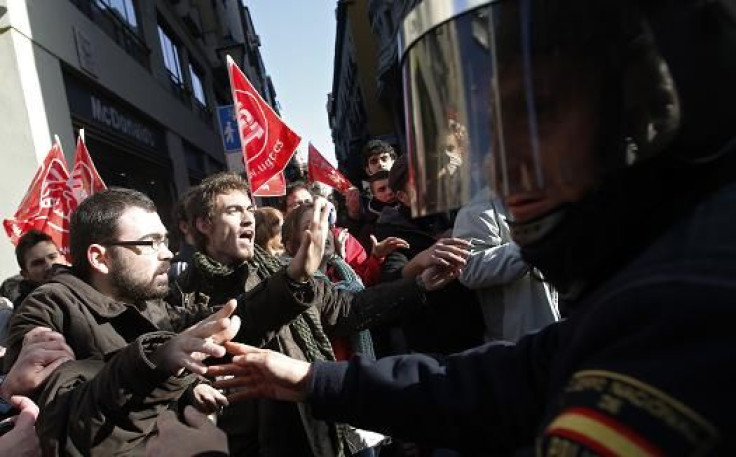Today In Europe Austerity: Strikes, Clashes In South, Solidarity Flaunted Up North
Strikes, protests, and police batons – especially in the jobless south

Frustration is spreading and getting more intense in Europe over austerity measures linked to the euro zone’s sovereign debt crisis, with sporadic work stoppages in Italy and Greece, general strikes in the Iberian Peninsula and protests in France and Belgium, as part of a European day of action against spending cuts.
Predictably, where there are more unemployed people, especially unemployed young people, there was more tension on Wednesday.
As the public feels the effects of European government austerity measures aimed at curbing public spending, reeling in deficits and cutting borrowing costs, the drum beat against steep cuts to health care, education, pensions and unemployment benefits get louder -- especially in countries most affected by the euro zone sovereign debt crisis and the ensuing measures to reel in public spending.
The protests and strikes across the region were weighing on stocks indexes in London, Paris and Frankfurt on Wednesday, in addition to shutting down some industrial activity and transportation service across the region.
Greece
Thousands of civil servants took to the streets on Tuesday in Athens, where austerity protests have been most intense as the country grapples with the bailout terms established by the European Union and International Monetary Fund.
Public pensions have been cut in half for many Greek retirees. Civil servants that haven’t lost their jobs have seen their wages slashed by 40 percent.
"I have two children, they're twins, and the situation is tragic," Evangelia Katsaropoulou, an out-of-work former public employee, told CNN. "What I want to say to everyone is that they have to come onto the streets and shout so that these measures do not take place."
Greece’s unemployment rate is about 24 percent, up from 17.7 percent last year. Over half of Greeks under the age of 25 are out of work.
Spain (And Portugal)
Flights have been canceled and port traffic stopped in response to Prime Minister Mariano Rajoy’s deeply unpopular cuts. Strikes have caused electrical demand in Spain to be 12 percent lower as of noon on Wednesday, according to Bloomberg.
The General Workers’ Union called for a nationwide strike in construction, shipbuilding, energy and auto industries, according to the Associated Press. Dozens have been arrested and 34 people have been injured, including 18 police officers, according to Reuters.
Two people were arrested in downtown Madrid Wednesday, and riot police were seen hitting protesters with batons. For the first time, unions in Spain and neighboring Portugal coordinated general strikes in both countries.
Spain’s unemployment rate passed the 25 percent mark last month. The number of unemployed Spaniards has more than doubled since the country’s real estate bubble burst in 2008, according to the New York Times. As with Greece, more than half of Spaniards under the age of 25 are out of work.
Italy
Angry leftists stood off against riot police in Rome Wednesday calling for Prime Minister Mario Monti. Six police were injured in clashes in Milan and Turin, including one seriously in Turin, when about 20 protesters beat a cop with sticks and baseball bats, according to Agence-France Presse. One protesting elderly pensioner in Rome told the news agency she received $765 a month, of which 38 percent is taken for taxes.
Italy’s unemployment rate approached 11 percent in September, according to Eurostat, up from 9.7 percent last year. About 36 percent of Italy’s 600,000 youths (persons of working age under the age of 25) are unemployed, according to The Financial Times.
Germany
The country’s 8 million-member Federation of Trade Unions voiced solidarity with Europe-wide protests, organizing protests in several smaller towns but stopping short of calling for strikes. Michael Sommer, the head of the federation, known by its German acronym DGB, said on a German public radio program that austerity cuts are rooted in problems created by "domination by the financial markets” that are being resolved “in a one-sided way” in southern Europe.
Twenty-six Spain-bound flights from German airports were reportedly canceled Wednesday due to the shutdowns in Spain. High-speed rail service between Germany and neighboring Belgium, The Netherlands and France was disrupted due to trade union solidarity protests in those countries, according to AFP.
Germany’s unemployment rate stood at 6.5 percent in September, up from an annual average of 5.9 percent last year but lower than the 7.1 percent reported in 2010.
© Copyright IBTimes 2024. All rights reserved.












